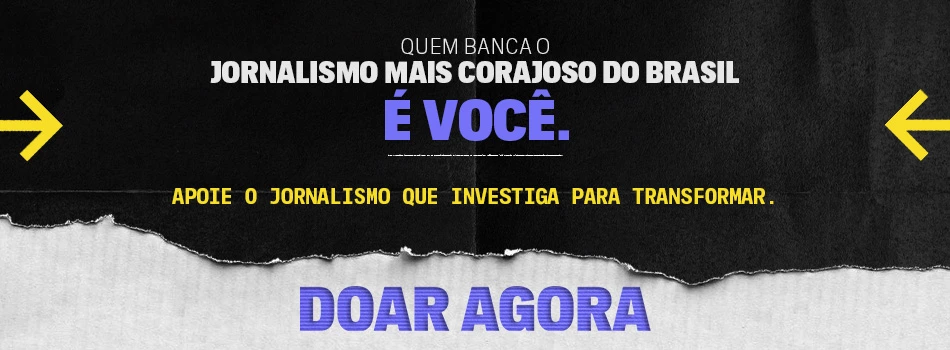Leia este texto em português →
The Intercept Brasil is refusing to hand over data to a police investigation that aims to shred journalists’ constitutionally guaranteed rights. Santa Catarina Civil Police demanded that we reveal our source(s) in the Mari Ferrer Case, a four-year-old investigation that shocked Brazil, embarrassed the state’s judiciary, and led to a new federal law.
Since then, the state’s authorities have sought their revenge in a series of judicial actions that have drawn condemnation from the United Nations, the Interamerican Commission on Human Rights, and a Supreme Court minister. At least 22 civil society organizations called the persecution of Schirlei Alves, the journalist who authored the story, “inadmissible and outrageous.” Schirlei is currently appealing a one-year prison sentence and R$ 400,000 indemnification. A judge also ordered specific edits to the published article.
Ignoring the international outcry, last week, the state police demanded The Intercept Brasil provide “detailed identification of the sources of information used in the preparation of the report, including data indicating the origin of the confidential content mentioned.” It also demanded “information on how the material disclosed was obtained” and “any supplementary records or documents that could help the police authority clarify the facts.”
On Wednesday, we sent them our response: No.
We made it clear that the investigation is outrageous, the police’s demands violate our constitutional rights, and we will never comply under any circumstances.
“The Brazilian State and its agents cannot compel journalists to hand over their work instruments, under penalty, in addition to the most complete nullity of this evidence, of possible responsibility for excesses they commit, in the form of the law,” reads our reply. “Efforts to relativize the secrecy of sources are reminiscent of an authoritarian winter of very sad memory,” it continues.
It is unclear why the police decided to make this unconstitutional demand four years after the fact and three years after the investigation was opened. But what is clear is that we will not be intimidated and we will not stop seeking justice until every ruling against Schirlei Alves is overturned.
But battling the police and the judiciary on their home turf is not easy and certainly not cheap. That is why we created our Legal Defense Fund. It’s a way for our community to show their solidarity with Schirlei and to guarantee that The Intercept Brasil will always have the resources it needs to take on corruption, injustice, bullies, and billionaires whenever and wherever is necessary.
We are facing an unprecedented wave of judicial harassment, with at least 25 open lawsuits brought forward by coupmongers, environmental criminals, extremist politicians, mining companies, and far-right demagogues who would prefer that our independent journalism did not exist.
The Mari Ferrer Case
In 2020, The Intercept Brasil published video footage of a court proceeding in which Cláudio Gastão da Rosa Filho, the defense attorney, harassed and humiliated Mari Ferrer, who police said was raped by wealthy businessman André de Camargo Aranha at the posh Café de la Musique beach club in 2018 after being drugged by his accomplices.
In the hearing, the prosecutor and judge neglected to effectively intervene despite Ferrer’s tearful pleading. “Your Honor, I’m begging for respect. Not even the accused are treated the way I’m being treated. For God’s sake, what is this?” implored Ferrer in the recording.
Despite video evidence and eyewitness testimonies showing Ferrer stumbling and slurring her words, Thiago Carriço de Oliveira, the prosecutor in the case, argued there was no way for the businessman to know consent was absent during the sexual act. Aranha was acquitted by judge Rudson Marcos on those grounds.
Our reporting provoked an immediate national firestorm, and it led to a new federal law that punishes justice system professionals who revictimize sexual assault victims during the legal process.
The revelations also provoked a violent legal response from the three men in the video, who each sued The Intercept Brasil’s reporter both criminally and civilly. Two of the six suits against Schirlei led to a sentence of one year in open prison and a R$ 400,000 indemnification to Marcos and Carriço, the judge and prosecutor, for supposed crimes against their honor – an amount equivalent to more than five years of an average journalist’s salary. The Intercept Brasil, which is bearing all legal costs, has appealed the ruling; three civil cases continue to drag on, while one criminal case has been closed.
Judge Marcos was sanctioned by the National Council of Justice in a unanimous decision for his omission in protecting Ferrer – just days after Schirlei’s conviction. The Public Ministry also opened a disciplinary investigation into Carriço that remains open.
In addition to suing Schirlei, Judge Marcos filed at least 182 lawsuits to silence people who posted a hashtag to discuss the case online – among them many prominent feminist celebrities.
“My only wish was to expose the truth and that’s what I did. This persecution has already caused me irreparable damage. It is an attempt to silence and intimidate not only me, but Brazilian investigative journalism,” said Schirlei. “Now, I hope that Mari Ferrer’s suffering and mine can lead to changes so that more women don’t have to go through what we were subjected to. We deserve better.”
Schirlei’s courage in reporting the story and in bravely standing up to the subsequent campaign of judicial harassment has been remarkable. But her battle is far from over.
DOE FAÇA PARTE
Intercept Brasil existe para produzir jornalismo sem rabo preso que você não encontra em nenhum outro lugar.
Enfrentamos as pessoas e empresas mais poderosas do Brasil porque não aceitamos nenhum centavo delas.
Dependemos de nossos leitores para financiar nossas investigações. E, com o seu apoio, expusemos conspirações, fraudes, assassinatos e mentiras.
Neste ano eleitoral, precisamos colocar o maior número possível de repórteres nas ruas para revelar tudo o que os poderosos querem esconder de você.
Mas não podemos fazer isso sozinhos. Precisamos de 300 novos apoiadores mensais até o final do mês para financiar nossos planos editoriais. Podemos contar com seu apoio hoje?











